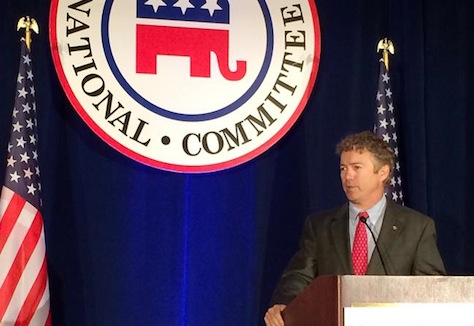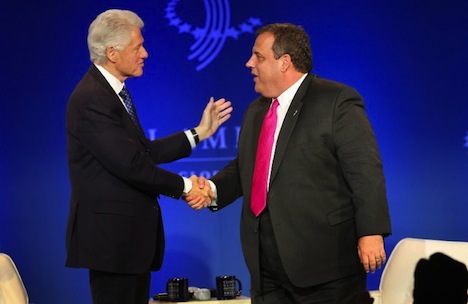With the dream of uniting an unlikely coalition of socially liberal Millennials, fiscally conservative ‘tea party’ supporters and a swatch of economic liberals in both parties, US senator Rand Paul of Kentucky became the second major US figure to launch a 2016 presidential bid today.![]()
His chances of winning the White House aren’t, frankly, great. But they’re not non-existent, and if he wins the Republican nomination, he could potentially convince a much wider electorate to support him over the frontrunner for the Democratic nomination, Hillary Rodham Clinton, the former US secretary of state. If he fails, he’ll still have burnished his profile as a thoughtful foreign policy counterweight within the Republican Party — sort of a conservative version of the former Democratic senator from Wisconsin, Russ Feingold. More importantly, he will drive a necessary debate on controversial aspects of US foreign policy that are increasingly taken for granted.
As a deeply libertarian voice in the US Senate and an avowed non-interventionist when it comes to the Middle East, Paul will present the strongest challenge to mainstream US foreign policy that, despite recently squabbles over Iran, Israel and Russia, remains chiefly bipartisan in nature. He will make the case for a truly alternative US policy worldview that questions everything from a 14-year global approach to terrorism, Internet surveillance and civil liberties, the proliferation of unmanned ‘drone’ aircraft in the US effort to stop radical Islamism, the use of drones to target US nationals abroad, ongoing US military action in Afghanistan and escalating action in Syria and Iraq, and the Obama administration’s ongoing diplomatic initiatives with Cuba and Iran. He is also likely to question the US Congress’s decades-long supine position on foreign policy.
* * * * *
RELATED: Six important points from Clinton’s foreign policy interview [August 2014]
RELATED: What would Jeb Bush’s foreign policy look like?
[December 2014]
* * * * *
Paul will find many traditional allies on the right, who believe that the United States is at its best when its military adventurism is kept to a minimum, and he will find many traditional allies on the left, where even Obama supporters have grumbled for years that his administration features more continuity than rupture with many aspects of the foreign policy developed by his predecessor, George W. Bush. Initially, Paul will benefit from supporters who backed his father, Ron Paul, the US congressman from Texas, in his 2008 and 2012 presidential contests. Though Paul (the father) served as something like the crazy/wise uncle of the Republican contests in 2008 and 2012, there’s a sense that his son is both more polished and more pragmatic.
Paul will also benefit from the quiet support of Mitch McConnell, Paul’s Kentucky colleague in the Senate. Paul’s support crucially boosted McConnell, now the Senate majority leader, to primary and general election victories in the 2014 midterm elections. McConnell’s support and his access to national donors should give Paul the kind of ‘insider-outsider’ credentials to make him a serious threat for the nomination. It wouldn’t be surprising to learn that Paul has reached out to the 2012 nominee, former governor Mitt Romney, with whom Paul’s father developed a close relationship in the 2012 contest. Other young, libertarian-minded Republican officials might also support Paul.
Paul’s campaign means that the Republican nomination contest will feature the most robust debate since perhaps the 2008 nomination contest between Obama and Clinton on the role of the United States in the world. Already, Paul has demonstrated his willingness to break with Republican orthodoxy by cautiously welcoming the Obama administration’s relaxation of ties with Cuba. His reticence to engage US troops abroad will also bring him into conflict with much more hawkish Republican voices so long as Iran, Yemen and the Islamic State (ISIS/ISIL) top the list of US foreign policy headaches as the 2016 campaign season unfolds.
But Paul’s presence in the 2016 contest will most importantly highlight that there’s just not that much difference between Clinton, on the one hand, and the Republican foreign policy establishment that would likely take power if Republican frontrunners like former Florida governor Jeb Bush or Wisconsin governor Scott Walker.
Continue reading Expect Paul campaign to launch genuine US foreign policy debate

